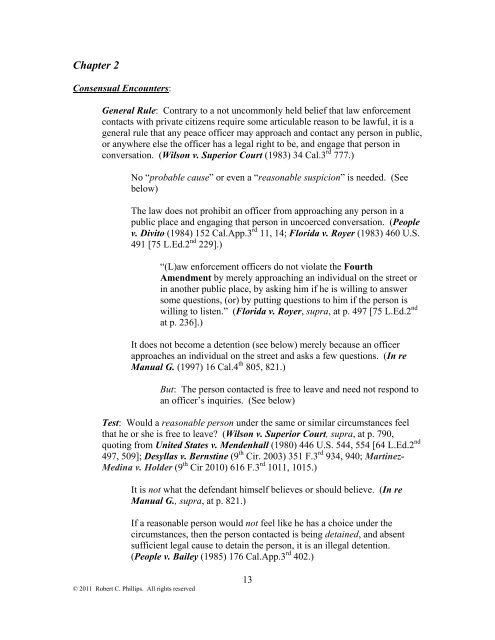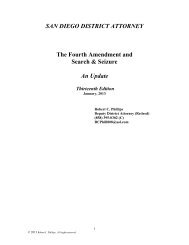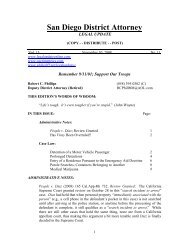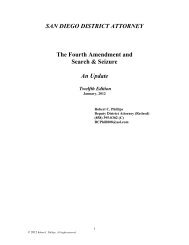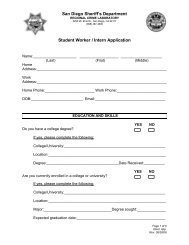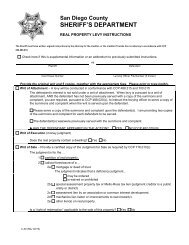- Page 1 and 2:
SAN DIEGO DISTRICT ATTORNEY The Fou
- Page 3 and 4:
Table of Contents Page Chapter Summ
- Page 5 and 6:
New Crimes Committed in Response to
- Page 7 and 8:
The Use of Firearms 26 The Use of H
- Page 9 and 10:
Detention of Residents During the E
- Page 11 and 12:
Merchants, Library Employees and Th
- Page 13 and 14:
Legal Requirements of an Arrest: 14
- Page 15 and 16: Telephonic Arrest Warrant 159 Ramey
- Page 17 and 18: Consequences of a Ramey/Payton Viol
- Page 19 and 20: P.C. § 849(c): Record of Arrest of
- Page 21 and 22: Reasonableness: 229 Determining Rea
- Page 23 and 24: Records of Foreign Corporations Pro
- Page 25 and 26: An Informant Sworn Before A Magistr
- Page 27 and 28: Exceptions 309 Prisoner Visitors 30
- Page 29 and 30: Civil or Criminal Liability; Relian
- Page 31 and 32: How Accomplished 373 When Warrants
- Page 33 and 34: The “Plain Sight Observation” v
- Page 35 and 36: Other California or United States R
- Page 37 and 38: A State Hospital’s Drug Testing P
- Page 39 and 40: Body Cavity Search 450 Visual Body
- Page 41 and 42: Collection of Samples For Present a
- Page 43 and 44: Inventory Searches 494 “Pat Down
- Page 45 and 46: Securing Cases 522 Detention of a R
- Page 47 and 48: Chapter 12: Open Fields: 563 Genera
- Page 49 and 50: Probation: 596 Statutory Authorizat
- Page 51 and 52: Limitation; Free and Voluntary Requ
- Page 53 and 54: General Rule 636 Examples: 638 Land
- Page 55 and 56: History: “The exclusionary rule w
- Page 57 and 58: exclusion. (United States v. Cho (9
- Page 59 and 60: Using the above factors, the fact t
- Page 61 and 62: New Crimes Committed in Response to
- Page 63 and 64: “I fully recognize that under the
- Page 65: Police-Citizen Contacts: Contacts b
- Page 69 and 70: Asking a vehicle passenger to step
- Page 71 and 72: Black defendant late at night, and
- Page 73 and 74: 690]; “threatening an unlawful de
- Page 75 and 76: The information motivating an offic
- Page 77 and 78: “(E)ven when a police officer is
- Page 79 and 80: “probable cause,” illegal. (Uni
- Page 81 and 82: y belief suspect was attempting to
- Page 83 and 84: The suspect is uncooperative. The o
- Page 85 and 86: People v. Soun (1995) 34 Cal.App.4
- Page 87 and 88: A stop and detention based upon sta
- Page 89 and 90: A “High Crime” or “High Narco
- Page 91 and 92: outside its lane, was cause to effe
- Page 93 and 94: (See Brendlin v. California (2007)
- Page 95 and 96: across his upper torso, barring the
- Page 97 and 98: under the influence to justify a tr
- Page 99 and 100: Mistake of Law vs. Mistake of Fact:
- Page 101 and 102: violation. (United States v. Choudh
- Page 103 and 104: Motor Vehicle Passengers: To Arrest
- Page 105 and 106: justify a continued detention for t
- Page 107 and 108: Under the same rationale, some fede
- Page 109 and 110: Flight: While the “flight” of t
- Page 111 and 112: Rettele (2007) 550 U.S. 609 [167 L.
- Page 113 and 114: Review was granted in this case by
- Page 115 and 116: traffic stop.” (United States v.
- Page 117 and 118:
stop of the defendant’s car. (Uni
- Page 119 and 120:
660]; People v. Washburn (1968) 265
- Page 121 and 122:
or more), and V.C. § 23152 (drivin
- Page 123 and 124:
(People v. Green (1991) 227 Cal.App
- Page 125 and 126:
A person merely approaching a house
- Page 127 and 128:
suspect. Also, unconnected anonymou
- Page 129 and 130:
highway driver, ‘weaving all over
- Page 131 and 132:
Corroboration: The information moti
- Page 133 and 134:
putting their anonymity at risk), a
- Page 135 and 136:
the search,” a vice principal’s
- Page 137 and 138:
undue invasion of privacy. (Frankli
- Page 139 and 140:
The only issue left hanging by Chri
- Page 141 and 142:
Similar cases: No seizure when an o
- Page 143 and 144:
A traffic stop for a violation of V
- Page 145 and 146:
Spotlighting the defendant in a hig
- Page 147 and 148:
committed a criminal offense. (Cita
- Page 149 and 150:
police officers also had reasonable
- Page 151 and 152:
Examples: Similarly, the fact that
- Page 153 and 154:
910, 918-921; but qualified immunit
- Page 155 and 156:
United States for prosecution. (Alv
- Page 157 and 158:
McKinney (9 th Cir. 2005) 394 F.3 r
- Page 159 and 160:
is excessive force sufficient to cr
- Page 161 and 162:
Duty to Warn: © 2011 Robert C. Phi
- Page 163 and 164:
or window of the house in which the
- Page 165 and 166:
Applicable Statutes: P.C. § 196: H
- Page 167 and 168:
Constitution. A Fourth Amendment
- Page 169 and 170:
This presumption, however, is rebut
- Page 171 and 172:
v. Lee (2005) 131 Cal.App.4 th 1413
- Page 173 and 174:
own delusions. (People v. Mejia-Len
- Page 175 and 176:
caused a jury to believe that the o
- Page 177 and 178:
But on the other hand, it is consti
- Page 179 and 180:
Other federal circuits have approve
- Page 181 and 182:
When the suspect attacked an office
- Page 183 and 184:
Legal Authority for Arrests: Arrest
- Page 185 and 186:
Arrests by a Private Person: P.C.
- Page 187 and 188:
Superior Court (1950) 98 Cal.App.2
- Page 189 and 190:
P.C. § 830.8(c): National Park Ran
- Page 191 and 192:
42 U.S.C. § 1983 federal civil rig
- Page 193 and 194:
misdemeanor not in the officer’s
- Page 195 and 196:
provisions of the Penal Code on fel
- Page 197 and 198:
3. Battery on School Grounds during
- Page 199 and 200:
P.C. § 243(f)(10): “Dating Relat
- Page 201 and 202:
“No hard and fast rule can, howev
- Page 203 and 204:
during a nighttime search without j
- Page 205 and 206:
ooking a suspect for a non-bookable
- Page 207 and 208:
Violation of V.C. § 23332, relatin
- Page 209 and 210:
Misdemeanor domestic violence, per
- Page 211 and 212:
The warrant of arrest indicates tha
- Page 213 and 214:
pre-filing arrest warrants are now
- Page 215 and 216:
Michigan (2006) 547 U.S. 586 [165 L
- Page 217 and 218:
“Thus, for Fourth Amendment purpo
- Page 219 and 220:
charge, whether or not the offense
- Page 221 and 222:
need for justifying nighttime servi
- Page 223 and 224:
to their entry into the residence.
- Page 225 and 226:
possibility that defendant would di
- Page 227 and 228:
seldom, if ever, justify a warrantl
- Page 229 and 230:
A parolee (and, therefore, presumab
- Page 231 and 232:
circumstances is not an exception t
- Page 233 and 234:
attempt to serve an arrest warrant
- Page 235 and 236:
“(A)n officer’s reliance on the
- Page 237 and 238:
properly be charged with knowledge,
- Page 239 and 240:
However, the Court in Downing noted
- Page 241 and 242:
warrant exists for that person. (Mo
- Page 243 and 244:
Cal.App.3 rd 849, 854; and Johanson
- Page 245 and 246:
The United States Supreme Court, un
- Page 247 and 248:
(Cornejo v. County of San Diego (9
- Page 249 and 250:
A Miranda-style admonishment obviou
- Page 251 and 252:
A bail bondsman. A relative or othe
- Page 253 and 254:
The calls are to be at public expen
- Page 255 and 256:
P.C. § 849(c): Any record of arres
- Page 257 and 258:
Presumptions: See “Arrests,” ab
- Page 259 and 260:
Exceptions: Examples: Observations
- Page 261 and 262:
See “Good Faith,” below, and
- Page 263 and 264:
L.Ed.2 nd 496]; see also People v.
- Page 265 and 266:
A “knock and notice” violation:
- Page 267 and 268:
DNA with that left at a crime scene
- Page 269 and 270:
probable cause supporting the concl
- Page 271 and 272:
circumstances. The defendant’s ac
- Page 273 and 274:
A passenger in a vehicle that he ne
- Page 275 and 276:
Cal.App.3 rd 1209; People v. Ooley
- Page 277 and 278:
etained a reasonable expectation of
- Page 279 and 280:
documents at the time of seizure. (
- Page 281 and 282:
Also, using counterfeit money to re
- Page 283 and 284:
Determining Reasonableness: The rea
- Page 285 and 286:
When a stop or search is not a “r
- Page 287 and 288:
Case Law: Army, Navy, Air Force, or
- Page 289 and 290:
Chapter 6 Searches With a Search Wa
- Page 291 and 292:
(United States v. Reeves (9 th Cir.
- Page 293 and 294:
to be defective. (United States v.
- Page 295 and 296:
Delay of 52 days between a controll
- Page 297 and 298:
A warrant that failed to identify a
- Page 299 and 300:
mail system, or a computer server,
- Page 301 and 302:
Under California law, while failure
- Page 303 and 304:
to believe that blood, semen, or an
- Page 305 and 306:
served with a search warrant issued
- Page 307 and 308:
qualified immunity from civil liabi
- Page 309 and 310:
having communicated a threat to a p
- Page 311 and 312:
Note that Gates also describes the
- Page 313 and 314:
It is irrelevant that a peace offic
- Page 315 and 316:
cause.” (People v. Nicholls (2008
- Page 317 and 318:
a factor which will help to overcom
- Page 319 and 320:
Whether probable cause exists to se
- Page 321 and 322:
Whether the child is fully or parti
- Page 323 and 324:
And Mahlberg v. Mentzer (8 th Cir.
- Page 325 and 326:
could result in suppression of all,
- Page 327 and 328:
such media prior to a forensic exam
- Page 329 and 330:
Multiple Affiants/Affidavits: There
- Page 331 and 332:
There is a reasonable basis for bel
- Page 333 and 334:
See “Standing,” above. Informat
- Page 335 and 336:
person, vehicle, or other container
- Page 337 and 338:
Citizen Informants: Private persons
- Page 339 and 340:
The expected favor or personal gain
- Page 341 and 342:
252 F.3 rd 1070.) unless corroborat
- Page 343 and 344:
Superior Court [People] (2010) 186
- Page 345 and 346:
The danger is in insuring that the
- Page 347 and 348:
Computer Searches: Use of a Search
- Page 349 and 350:
the illegal search. (Nix v. William
- Page 351 and 352:
613]; People v. Paulson (1990) 216
- Page 353 and 354:
Mortgage Fraud Records: P.C. § 532
- Page 355 and 356:
court of “general jurisdiction;
- Page 357 and 358:
protected by the wiretap statutes.
- Page 359 and 360:
admissible in court per Evid. Code
- Page 361 and 362:
Under Title III; “(I)t shall not
- Page 363 and 364:
P.C. § 632.5: Cellular radio telep
- Page 365 and 366:
A peace officer is required to stop
- Page 367 and 368:
applicant to justify his or her bel
- Page 369 and 370:
Gonzalez, Inc. (9 th Cir. 2006) 437
- Page 371 and 372:
“any aural transfer made in whole
- Page 373 and 374:
destruction, or 11419, relating to
- Page 375 and 376:
It is not necessary that the govern
- Page 377 and 378:
identity is not known, then that in
- Page 379 and 380:
• Terminate upon attainment of th
- Page 381 and 382:
The Attorney General shall, upon th
- Page 383 and 384:
• Other data that the Legislature
- Page 385 and 386:
• Kept where the judge orders.
- Page 387 and 388:
P.C. § 629.72: Motions to Suppress
- Page 389 and 390:
any person regardless of how the pe
- Page 391 and 392:
For crimes listed in P.C. § 629.52
- Page 393 and 394:
A fine not exceeding two thousand f
- Page 395 and 396:
P.C. § 629.90: Order for Cooperati
- Page 397 and 398:
P.C. § 629.96: Severability: If an
- Page 399 and 400:
“ICRA”) applies instead. Howeve
- Page 401 and 402:
and Federal Rules of Criminal Proce
- Page 403 and 404:
who conduct investigations under th
- Page 405 and 406:
Peterson (1973) 9 Cal.3 rd 717, 723
- Page 407 and 408:
aggravated as to be a constitutiona
- Page 409 and 410:
For example: also People v. Flores
- Page 411 and 412:
the purpose of a police visit and a
- Page 413 and 414:
door slammed in their face at the f
- Page 415 and 416:
ecause “an unannounced entry may
- Page 417 and 418:
California (1990) 496 U.S. 128, 138
- Page 419 and 420:
But see United States v. Payton (9
- Page 421 and 422:
“quashal” of the Government’s
- Page 423 and 424:
The “return package” consists o
- Page 425 and 426:
See United States v. Vesikuru (9 th
- Page 427 and 428:
estricted to protecting confidentia
- Page 429 and 430:
In a traversal motion: The trial co
- Page 431 and 432:
Return of Property: (4) The law enf
- Page 433 and 434:
Take the original warrant, with a s
- Page 435 and 436:
Geothermal Services Co. v. Superior
- Page 437 and 438:
necessary under the circumstances.
- Page 439 and 440:
guilty. The only issue to be resolv
- Page 441 and 442:
and credible information that the k
- Page 443 and 444:
No Search: There is no search when
- Page 445 and 446:
Observing defendant retrieving cont
- Page 447 and 448:
Examples: Exceptions: This, however
- Page 449 and 450:
Examples: for that purpose.’ (Peo
- Page 451 and 452:
To check on the welfare of persons
- Page 453 and 454:
that dangerous weapons will not be
- Page 455 and 456:
A state hospital’s drug testing p
- Page 457 and 458:
defendant about issues unrelated to
- Page 459 and 460:
School Searches: © 2011 Robert C.
- Page 461 and 462:
luggage on the conveyor belt for x-
- Page 463 and 464:
See also the concurring, minority o
- Page 465 and 466:
only citing the driver for a speedi
- Page 467 and 468:
“custodial arrest.” (See People
- Page 469 and 470:
Contemporaneous in Time and Place:
- Page 471 and 472:
search incident to an arrest where
- Page 473 and 474:
not be admissible in court. The lik
- Page 475 and 476:
manner and without use of excessive
- Page 477 and 478:
Examples: Holding a subject’s Ada
- Page 479 and 480:
A school search “will be permissi
- Page 481 and 482:
subjected to physical touching of h
- Page 483 and 484:
movements of the passenger during t
- Page 485 and 486:
a possible weapon below the clothin
- Page 487 and 488:
a finding of probable cause to sear
- Page 489 and 490:
Other Situations: Taking the hint,
- Page 491 and 492:
Searching for Identification: perso
- Page 493 and 494:
(United States v. Kinkade (9 th Cir
- Page 495 and 496:
Prisoner Searches: A person who is
- Page 497 and 498:
Exceptions: Although Smith has neve
- Page 499 and 500:
Note also authority (albeit the min
- Page 501 and 502:
Thompson v. Los Angeles, supra, how
- Page 503 and 504:
Restrictions: In the case of most m
- Page 505 and 506:
authority of a search warrant issue
- Page 507 and 508:
517, 526 [82 L.Ed.2d 393, 402-403 .
- Page 509 and 510:
ules nor California’s Privacy Act
- Page 511 and 512:
The sole exception is legal corresp
- Page 513 and 514:
Immediately prior to a proposed sea
- Page 515 and 516:
violation. (Overton v. Bazzetta, su
- Page 517 and 518:
(C): Forward the collected specimen
- Page 519 and 520:
(4): Includes attempts. (5): These
- Page 521 and 522:
Subd. (a)(1): Collection from any a
- Page 523 and 524:
Subd. (a)(4): Collection from parol
- Page 525 and 526:
(iii): The person has any record of
- Page 527 and 528:
on duty, which must include the det
- Page 529 and 530:
(3): Only tests of value to law enf
- Page 531 and 532:
taking of the sample, is a constitu
- Page 533 and 534:
With Probable Cause When the Vehicl
- Page 535 and 536:
If his car is within the “lunging
- Page 537 and 538:
Thornton v. United States, supra, a
- Page 539 and 540:
see also United States v. Finley (5
- Page 541 and 542:
Superior Court [Nasmeh] (2007) 151
- Page 543 and 544:
cause to believe is there, is subje
- Page 545 and 546:
(Wyoming v. Houghton (1999) 526 U.S
- Page 547 and 548:
Where the defendant’s bloody shoe
- Page 549 and 550:
Using an inventory search of a vehi
- Page 551 and 552:
© 2011 Robert C. Phillips. All rig
- Page 553 and 554:
Court as authority for an officer t
- Page 555 and 556:
594, 598-599 [69 L.Ed.2 nd 262, 268
- Page 557 and 558:
The California Supreme Court has ru
- Page 559 and 560:
California is now in accord with th
- Page 561 and 562:
driving on a suspended license or n
- Page 563 and 564:
“As a general rule, to satisfy th
- Page 565 and 566:
ills she used were counterfeit. Als
- Page 567 and 568:
courts have extended Fourth Amendme
- Page 569 and 570:
Cir. 1993) 6 F.3 rd 673; but see St
- Page 571 and 572:
supervisors was tested by the O’C
- Page 573 and 574:
Securing the Premises pending the o
- Page 575 and 576:
Securing Cases: Securing a residenc
- Page 577 and 578:
asking questions of the occupant th
- Page 579 and 580:
Note: Exigent circumstances might b
- Page 581 and 582:
uyers the house, was not authorized
- Page 583 and 584:
See “Protective Sweeps,” below.
- Page 585 and 586:
upheld absent an articulable reason
- Page 587 and 588:
insufficient cause to do a protecti
- Page 589 and 590:
yard, in that his marijuana plants
- Page 591 and 592:
for believing’ that ‘a person w
- Page 593 and 594:
Welfare Checks, the “Emergency Ai
- Page 595 and 596:
that an emergency is unfolding in t
- Page 597 and 598:
apparently had been struck. The war
- Page 599 and 600:
the immediate, warrantless entry in
- Page 601 and 602:
Emergency Exception and the Odor of
- Page 603 and 604:
pp. 45-52]; People v. Codinha (1982
- Page 605 and 606:
Chapter 11 New Law Enforcement Tech
- Page 607 and 608:
California’s previous rule that o
- Page 609 and 610:
public. Knotts, although warning th
- Page 611 and 612:
of keeping weapons off campuses. Th
- Page 613 and 614:
interests.’” (United States v.
- Page 615 and 616:
Referring to the standards for the
- Page 617 and 618:
Chapter 13 Searches of Containers:
- Page 619 and 620:
Incident to Arrest, In a Vehicle: W
- Page 621 and 622:
asking a friend to retrieve what of
- Page 623 and 624:
Searches of Cell Phones, Disks, Com
- Page 625 and 626:
program unavailable to the general
- Page 627 and 628:
the result of work-related messagin
- Page 629 and 630:
The Fourth Amendment was not implic
- Page 631 and 632:
Customs Inspections: Similarly, the
- Page 633 and 634:
An addressee has both a possessory
- Page 635 and 636:
Chapter 14 Border Searches: General
- Page 637 and 638:
The statutory authority for the Coa
- Page 639 and 640:
431 U.S 606, 619-622 [52 L.Ed.2 nd
- Page 641 and 642:
Cutting open luggage, if permanent
- Page 643 and 644:
normal expectation of privacy. It m
- Page 645 and 646:
See also United States v. Berber-Ti
- Page 647 and 648:
Chapter 15 Fourth Waiver Searches:
- Page 649 and 650:
§ 3067, so long as he knew that th
- Page 651 and 652:
justify a search for stolen propert
- Page 653 and 654:
ather than the probation officer as
- Page 655 and 656:
The Ninth Circuit Court of Appeal h
- Page 657 and 658:
a parolee. (Samson v. California (2
- Page 659 and 660:
Searching While In Ignorance of a S
- Page 661 and 662:
the defendant was subject to either
- Page 663 and 664:
A suspect subject to search and sei
- Page 665 and 666:
[roommate's consent, obtained after
- Page 667 and 668:
officers have a “reasonable suspi
- Page 669 and 670:
Viers further held that it was irre
- Page 671 and 672:
ecord of assault on a peace officer
- Page 673 and 674:
“(T)he government’s burden to s
- Page 675 and 676:
“(I)mplicit in the officer’s st
- Page 677 and 678:
© 2011 Robert C. Phillips. All rig
- Page 679 and 680:
Consent During a Prolonged Detentio
- Page 681 and 682:
this procedure, and therefore does
- Page 683 and 684:
methamphetamine was hidden in a par
- Page 685 and 686:
Issues: May a suspect withdraw con
- Page 687 and 688:
But, a ruse is but one factor to co
- Page 689 and 690:
a factor that should be considered
- Page 691 and 692:
Examples: “(A) guest who has the
- Page 693 and 694:
when the son did not pay rent, and
- Page 695 and 696:
(1982) 30 Cal.3 rd 841, 855-857; wi
- Page 697 and 698:
But note, should the present cotena


